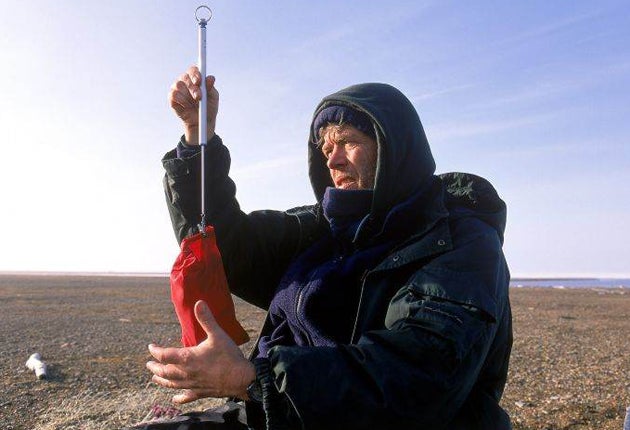Birdman's tale inspires National
Play based on lone scientist's 40-year study of Alaskan guillemots

Every spring for the last 40 years, American environmental scientist George Divoky has migrated to an isolated cabin on the remote Alaskan isle of Cooper Island, to study black guillemot seabirds.
In recent years global warming has caused puffins and polar bears to move to Cooper Island. Both species feed on guillemot chicks, meaning Mr Divoky's 40-year study, one of the longest-running seabird studies in history, is under threat. But while Mr Divoky's passion might be dying, his story will live on. Now, the scientist is "direct inspiration" for key scenes in Greenland, a play about climate change opening next month at London's National Theatre. "I came across Divoky's story in an article in The New York Times and his tale fascinated me," said Greenland co-writer Jack Thorne. "I took the idea of how he lived his life and then created my character."
Mr Divoky discovered a rare colony of black guillemots on Cooper Island in 1972. Returning to the isle regularly, he soon discovered that retreating sea ice was causing a decline in population.
The scientist spends three months a year sleeping in a small tent, warming himself over a small stove. Recently unwanted visitors have made conditions even more difficult.
"I had not seen polar bears on Cooper Island for the first 27 years I was on the island," Mr Divoky told the BBC earlier this year. "I would walk around without a gun. [Now] when they show up my first reaction is I have to get the gun and I am concerned for my own safety." The bears also disturb guillemot nests and prey on the birds' young.
The play's cast and crew have interviewed Mr Divoky along with Science Museum director Professor Chris Rapley, former Environment Secretary David Miliband and Labour Party leader Ed Miliband, who until May was the Government's Secretary of State for Energy and Climate Change.
"I didn't want to write a biographical account so I didn't interview him but I know some of the cast spoke to him about the production," Mr Thorne added. "My section of the play is about people living in the Arctic extremes, about someone who has devoted their life to something that is ultimately about destruction."
"We feel it's really important that the National Theatre is part of the debate on climate change, both in terms of what we should be doing as individuals and as a society," said Greenland's dramaturg and National Theatre associate director, Ben Power. "We are not claiming we have the answers. We think it's a fascinating topic and, using theatre, we're giving people something to think about, hopefully in an entertaining way. It's about provoking conversation."
According to Mr Power, the play, collaboratively penned by up-and-coming writers Mr Thorne, Moira Buffini, Matt Charman and Penelope Skinner, is a "semi-documentary piece covering everything from political solutions to global politics, the recent UN climate summit in Cancun, changes in populations and part of it is natural scientists out in the field".
The Miliband brothers, David and Ed, spoke to the writers while on a day-trip to the Met Office Hadley Centre for Climate Change in Exeter.
Join our commenting forum
Join thought-provoking conversations, follow other Independent readers and see their replies
Comments
Bookmark popover
Removed from bookmarks